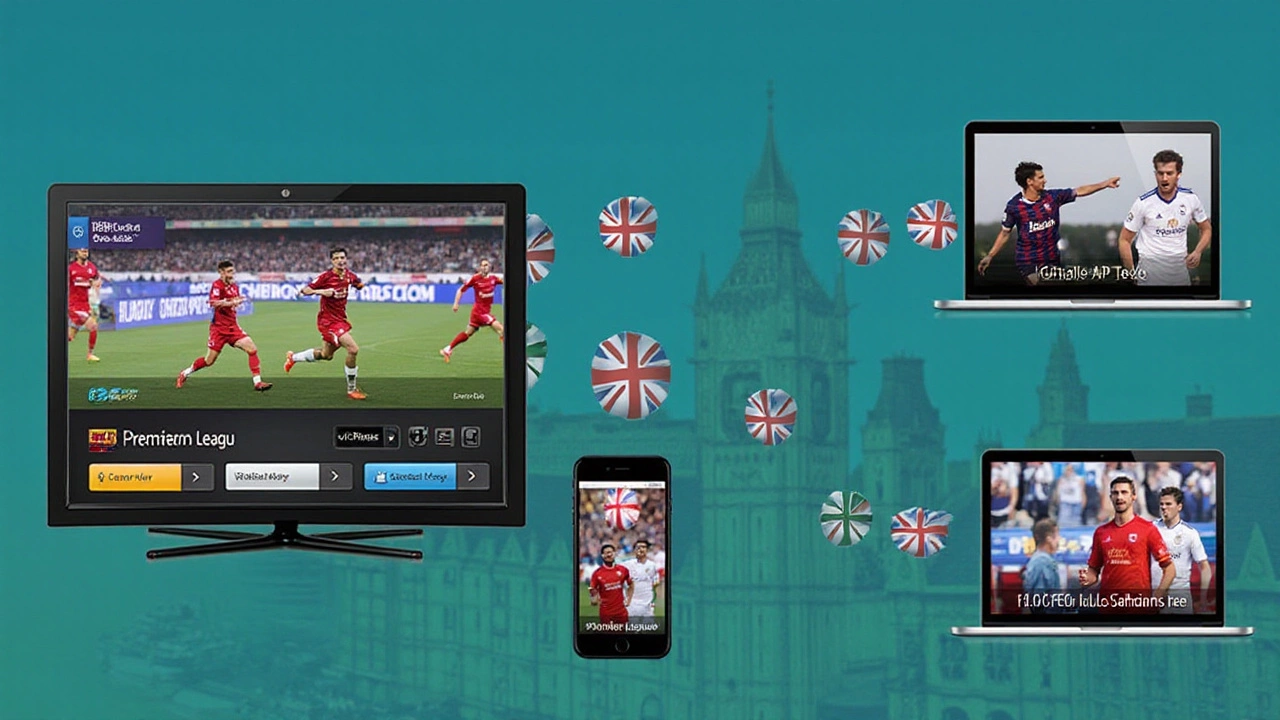How to Find Soccer Matches on TV Channels

Soccer is more than just a sport; it's a global phenomenon that brings people together across different cultures and continents. For many fans, watching live matches on television is an essential part of the experience. However, finding which TV channel the games are on can sometimes feel like a hunt for buried treasure.
In today's digital age, there are myriad options for viewing soccer, from traditional cable and satellite providers to online streaming services. But where do you start in finding 'the beautiful game' on TV? While the channels that air soccer matches can vary depending on your location, certain networks hold key broadcasting rights for major leagues and tournaments.
This article will guide you through the landscape of soccer broadcasting, exploring key networks and platforms that show live games. Whether you're looking to catch Premier League action, La Liga spectacles, or international tournaments, we'll help you navigate the channels and services that bring soccer to your living room. So grab your remote, get comfortable, and let's dive into the exciting world of televised soccer matches.
- Understanding Soccer Broadcast Rights
- Major Networks Televising Soccer
- Accessing Soccer via Cable Providers
- Online Streaming Options
- Tips for Watching Soccer Matches
- Regional & International Soccer Broadcasts
Understanding Soccer Broadcast Rights
To truly appreciate the complex world of television broadcasting for soccer, one must delve into the intricacies of soccer broadcast rights. These rights are essentially contracts that allow networks to show live soccer matches, often involving staggering amounts of money and strategic negotiations. Every league and tournament negotiates these rights to maximize their viewership and revenue. For instance, the English Premier League (EPL), one of the most-watched sports leagues globally, consistently breaks records with its broadcasting deals. Currently, the EPL has lucrative contracts with major networks like Sky Sports, BT Sport, and Amazon Prime Video, who jostle for the privilege of bringing live EPL games to audiences. These deals reach billions, a testament to soccer's vast appeal.
Broadcast rights aren't just about money—they also play a crucial role in shaping the viewing experience of fans across the globe. Certain networks may have exclusive rights to particular competitions, dictating which matches viewers can access in their regions. This means a soccer enthusiast in Australia might tune in to Optus Sport for live English Premier League games, whereas a fan in the United States would look to NBC Sports. These rights ensure that fans stay engaged with their favorite leagues, often tying them to specific broadcasters over the years. According to a study by Deloitte in 2022, these broadcasting deals significantly influence global viewership trends, showing a direct correlation between broadcasting contracts and audience engagement.
"Securing broadcasting rights is not just about having the games on TV; it's about delivering those electrifying moments to millions around the world." – Richard Scudamore, former Executive Chairman of the English Premier League
The distribution of broadcast rights involves a behind-the-scenes complexity that fans rarely get to see. At the core of these negotiations is the desire to expand soccer's accessibility while maintaining exclusivity. Different stakeholders, including leagues, clubs, and broadcasters, all have a say in how these rights are distributed. For example, UEFA, the governing body for European football, has developed a model where rights are sold to local broadcasters and even digital streaming platforms, ensuring that tournaments like the UEFA Champions League reach an ever-expanding audience. As digital streaming services grow in popularity, many are now acquiring these rights to offer live soccer matches, further diversifying how audiences receive and engage with the sport.
For the average fan trying to keep up with their favorite sports, understanding these rights is crucial. It affects whether a game will be available on free-to-air channels or if they will need a subscription to a premium service. Some countries have enacted regulations to ensure that significant sporting events are available on free-to-air channels, to ensure public access. This includes matches like the FIFA World Cup finals that historically draw large audiences. However, while these rules exist, many top-tier league games remain behind paywalls, underscoring the financial stakes involved in broadcasting soccer.
A closer look at soccer broadcast rights also uncovers interesting anomalies, such as the variance in costs across different regions. Broadcasting rights in certain countries can be much cheaper, offering fans access to games at a fraction of the cost compared to other regions. This aspect ties into how networks bundle their broadcasting packages, sometimes offering attractive rates to entice viewers in competition with other platforms. In essence, the business of showcasing soccer on television is a game in itself—a captivating blend of strategy, negotiation, and a shared love for the sport.
Major Networks Televising Soccer
When it comes to watching soccer on television, knowing which networks hold the broadcasting rights can be a game-changer. In the United States, for instance, soccer fans tune into a variety of networks that cater to their love for the game. NBC Sports holds the English-language rights to the Premier League, providing extensive coverage of this popular league with pre-match and post-match analysis. NBC offers multiple viewing options across its platforms, including NBCSN, Telemundo, and the Peacock streaming service, making it easier than ever for fans to catch their favorite teams in action. In addition to NBC, CBS Sports has secured rights to air the UEFA Champions League, showcasing the best of European club competition to soccer enthusiasts.
Meanwhile, over in the United Kingdom, Sky Sports and BT Sport dominate the landscape. Sky Sports, renowned for its comprehensive sports coverage, televises the bulk of Premier League games, while BT Sport captures UEFA Champions League matches. Fans in the UK often have heated debates over which network provides the best viewing experience, partly because Sky Sports offers in-depth analysis and extensive interviews, adding layers of engagement beyond the ninety minutes on the pitch.
"Our mission has always been to bring the most thrilling matches into homes, connecting audiences globally through their passion for football." - Sky Sports Chief Executive
Besides these giants, ESPN is notable for broadcasting Major League Soccer (MLS) games, catering to the growing American soccer fan base. They have committed to expanding soccer's reach by offering Spanish-language commentary through partnerships with ESPN Deportes. This inclusive approach is designed to bring diverse communities closer to the sport. Moreover, ESPN is known for distributing highlights and post-match reviews through its flagship channels and ESPN+. Also, La Liga enthusiasts can turn to ESPN for exclusive coverage of one of the world’s most skillful football leagues, ensuring matches featuring teams like Real Madrid and Barcelona are available to their broad audience.
In other parts of the world, networks such as beIN Sports and Fox Sports play a vital role in broadcasting international competitions and regional club leagues. BeIN Sports has a strong presence in Asia and the Americas, focusing on leagues like Ligue 1 and Serie A. They have made significant strides in securing rights to a variety of leagues, making them a pivotal player in bringing soccer matches to a global audience. Similarly, Fox Sports is instrumental during major international tournaments like the FIFA World Cup, carrying games live along with insightful analysis and behind-the-scenes coverage.
| Network | Key Leagues/Coverages |
|---|---|
| NBC Sports | Premier League |
| CBS Sports | UEFA Champions League |
| Sky Sports | Premier League, Championship |
| BT Sport | UEFA Champions League |
| ESPN | MLS, La Liga |
| beIN Sports | Ligue 1, Serie A |
| Fox Sports | FIFA World Cup |
Knowing these networks and their respective coverages introduces an interesting element to your viewing experience. It’s about choosing the right option that suits your needs, whether you're a die-hard fan of a particular league or someone who enjoys the international tournaments. With each network offering different angles and in-depth analyses, the choice of network defines much more than just the game—it shapes the soccer viewing culture in your home.

Accessing Soccer via Cable Providers
Cable television remains a trusty companion for many sports enthusiasts looking to catch their favorite soccer matches. In the United States and many parts of the world, major cable providers offer a plethora of channels that are dedicated to airing live football matches. Networks such as ESPN, Fox Sports, and NBC Sports are household names that regularly broadcast games from premier leagues like the English Premier League and Spain's La Liga. These channels provide comprehensive match coverage, including expert commentary, analysis, and post-game discussions.
To access soccer through cable, subscribers often need a specific sports package. These packages can include a range of channels dedicated to different sports, with varying levels of content and pricing structures. For example, ESPN has a multi-channel network that includes ESPN+, where viewers can find numerous football matches streamed live, along with additional content like documentaries and highlights. Fox Sports offers Fox Soccer Plus, an exclusive channel for aficionados of the sport. It's important to check with your provider regarding what's included in your basic cable subscription and what requires an additional fee.
"Watching soccer on traditional cable channels ensures you never miss a minute of the action, with seamless transitions between games and exclusive behind-the-scenes footages," shares renowned sports commentator Jim White.
Another interesting development in the realm of cable television is the option to access matches in high definition or even 4K UHD. Many large-scale tournaments and important matches are now being broadcast in stunning clarity, allowing fans to enjoy every detail of the game as if they were sitting live in the stadium. However, it's essential for viewers to have compatible television sets and subscriptions that offer these broadcast options.
For soccer enthusiasts living in regions with limited cable offerings, satellite services like DirecTV or Dish can be a viable solution. Such services often cover a broader network of channels, including international stations which might not be accessible via standard cable. This is particularly beneficial for fans interested in following teams or leagues outside their country, providing a more global perspective on the sport. Remember to consult with your provider to explore potential international packages that might open the doors to leagues you’re keen to follow.
If you're someone who loves documentation and statistics, it's good to know that some cable companies offer interactive services where you can delve into player stats, team rankings, and historical comparisons as part of the viewing experience. Engaging features like multi-angle views and interactive scoreboards are increasingly becoming part of the cable soccer viewing spectrum. This enriched viewing experience can make a massive difference in understanding the subtle nuances of the game enthusiasts hold dear.
Benefits of Cable Providers
Choosing cable providers also means enjoying bundled perks such as on-demand services where you might catch up on matches you missed due to work commitments or time zone differences. Unlike streaming services that can suffer from internet lag, cable offers more reliable streaming without buffering issues that can interrupt a gripping penalty shootout. Whether it's the compelling, nail-biting last moments of a match or the awe-inspiring skills of your favorite player, cable's consistent connection keeps soccer fans entwined with uninterrupted action.
In summary, while the landscape of sports viewing is rapidly evolving, TV channels through cable providers still play a pivotal role in delivering the excitement soccer fans around the world crave. With the right package, you can build your own soccer paradise in the comfort of your living room, sharing the electric atmosphere of the most celebrated stadiums globally.
Online Streaming Options
In the last few years, the way we watch soccer has drastically transformed, thanks to the mushrooming of online streaming services. More and more fans are cutting the cord and turning to these options for the flexibility and convenience they offer. No longer do you have to be tethered to your living room couch; with a reliable internet connection, you can enjoy live football matches from virtually anywhere. Major streaming giants like Amazon Prime and ESPN+ have carved their niche in the world of soccer broadcasting and are worth considering for any avid fan.
As part of their sports offerings, Amazon Prime Video has secured rights to broadcast select Premier League matches in the UK, making it a strong contender in the soccer streaming sector. Meanwhile, ESPN+ has picked up rights to various international competitions, including Italy’s Serie A and the MLS, which is growing rapidly in popularity. While both services require a subscription, the ability to watch live matches on a multitude of devices often outweighs the monthly cost for dedicated enthusiasts. It’s about bringing the stadium ambiance into your hands.
For those who relish a more tailored watch live experience, FuboTV is another option designed specifically for sports lovers. Offering packages that include channels like beIN Sports and NBC Sports, FuboTV ensures coverage of matches for leagues from around the globe. The platform is praised for its user-friendly interface and comprehensive sports coverage. As one FuboTV user points out:
"It’s like having a front-row seat to every game, no matter where you sit."
In terms of affordability, a mainstream choice is YouTube TV, which typically includes networks like Fox Sports and NBCSN in its repertoire. Platforms like Hulu + Live TV also offer similar packages but come with the additional benefit of Hulu's extensive library of series and movies. It's a win-win for families who want everything in one place. With such options now becoming the norm, it's no surprise that soccer fans are flocking to these digital havens, enticed by the idea of controlling how and where they watch their favorite teams. Options abound, but it often comes down to personal choice based on what works best for your viewing habits and budget.

Tips for Watching Soccer Matches
Watching a soccer match is about more than the game itself; it's an immersive experience filled with passion, strategy, and often, breathtaking moments. To make the most of every matchday, consider optimizing your setup at home. Firstly, ensure you have a high-definition television or a quality monitor when using streaming services. This ensures you won't miss any critical moments, whether it's a curling free-kick or a last-ditch tackle. Notably, sound quality matters too. Invest in a good sound system or headphones. The roar of the crowd, the commentary, and even the thud of a ball can elevate the experience beyond just viewing.
Besides technical considerations, understanding the structure of the season can enrich your experience. Keep an eye on the fixture list ahead of time, especially for the Premier League or La Liga. This helps in planning watch parties with friends or allocating time aside for that all-important derby you can't afford to miss. Being aware of time zone differences is crucial if you are following leagues from another continent. Set reminders or alarms if you need to wake up early or stay up late for a match. Some matches may be rescheduled due to unforeseen circumstances, so checking official team or league websites for updates pays off.
Engaging with the sport can be heightened through social media and soccer forums. Platforms like Twitter provide real-time feeds and reactions from fellow fans, analysts, and even players. Before the match, browse through team forums and official pages to gather insights on player form, injuries, or any behind-the-scenes drama. Engaged and knowledgeable watchers often enjoy games more thoroughly. As a bonus tip, streaming platforms like ESPN and NBC Sports offer match previews and analysis shows. They can be an excellent way to deepen your understanding of soccer tactics and narratives before the whistle blows.
To enjoy soccer matches without interruption, consider subscription packages offering ad-free experiences. Platforms such as Amazon Prime and Hulu have began offering bundled sports packages. These often come with features like DVR capabilities for recording live matches to watch later, or multi-game viewing options if you are following more than one game at a time. When it comes to choosing a streaming service or cable provider, evaluate which one offers the most complete coverage of the leagues you're interested in. Pay attention to contract terms, too; many providers offer month-to-month subscriptions, which can provide flexibility if you decide to switch services.
If attending the match isn't an option, try to replicate the stadium feeling at home. Invite some friends over, wear your team’s jersey, or prepare some traditional soccer food and drinks, like nachos or beers. Creating a soccer event atmosphere enhances enjoyment, transforming a simple watch into an event. For families, like mine with kids such as Lucan, it becomes a bonding time as you explain the game to younger ones, making every goal a jubilant, shared moment. Sharing your passion and emotions with loved ones reinforces why watching live sport, albeit on TV, remains such an engaging pastime.
Regional & International Soccer Broadcasts
Soccer, with its rich tapestry of tradition and fervor, crosses borders with ease, much like its devoted fans. The challenge, however, is ensuring that viewers across various regions can tune into their favorite matches, be it a local derby or an international showdown. The broadcasting landscape for soccer has evolved significantly, with different regions catering to their audiences through a specific set of channels and streaming options.
In Europe, the love for club and national football is palpable, influencing how games are broadcast. Countries often have dedicated sports channels like Sky Sports in the UK or beIN Sports in France that secure rights to air both local leagues and international tournaments such as the Champions League and the FIFA World Cup. Meanwhile, the Americas have seen a rise in dedicated soccer channels too. In the United States, networks like ESPN, NBC Sports, and Fox Sports hold contracts for broadcasting Major League Soccer, as well as international fixtures involving the U.S. Men's and Women's National Teams. Canada celebrates soccer with channels like TSN and Sportsnet, ensuring fans never miss crucial moments.
Heading to Asia, a fast-growing market for soccer, broadcasters like Star Sports in India and Fox Sports Asia have made it easier for fans there to witness the drama unfold from leagues like the English Premier League and Serie A. These networks cater to a diverse range of fans whose passion for the sport is as fiery as it is anywhere else. Africa, deeply entrenched in soccer culture, has SuperSport providing coverage of the Africa Cup of Nations and other major European leagues, ensuring the continent remains on top of the game.
A key development in soccer broadcasting is the advent of digital streaming services, which have revolutionized how regional and international soccer matches are consumed. Platforms like ESPN+, DAZN, and Amazon Prime Video offer live streaming options that cater to fans on-the-go. This gives viewers in areas where traditional access is limited the chance to watch matches live. Regional sports networks have responded by adapting to these changes, enhancing their digital offerings and making soccer more accessible than ever before.
"It's not just a game. It's a global spectacle," says Mark Chapman, a noted sports commentator, highlighting the universal appeal of soccer.The intertwining of traditional broadcasting with cutting-edge streaming services ensures that no fan is left behind. For families like mine, with children like my son Lucan showing early signs of fascination with the game, knowing where to find these matches allows for shared moments that are as valuable as they are cherished.
The competitive spirit that soccer brings is matched only by the race among broadcasters to secure rights for marquee events. Every country has channels vying for exclusive coverage, and knowing which ones to turn to is key for every soccer enthusiast. Whether you are seated comfortably in a living room in Rio, at a café in Rome, or cheering on from the stands in Cape Town, the game’s allure remains universal, and so does its accessibility. With each passing year, the opportunities to catch local and international games are expanding rapidly, ensuring that the world's most popular sport continues to enchant millions of fans worldwide.




